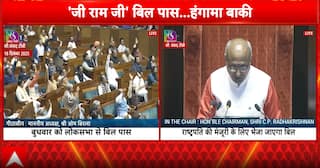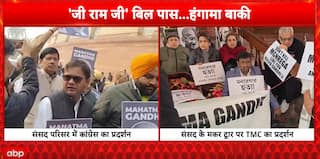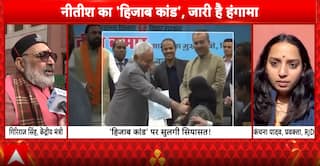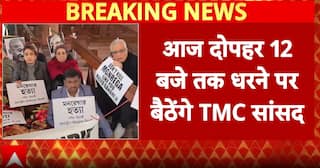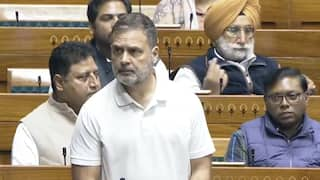Less Regulation Is Always Better, Good Newsrooms Run On Their Own: ABP Network CEO Avinash Pandey At Stanford Event
Avinash Pandey said pressure always comes from various stakeholders, in addition to the government, but the Indian media continues to be ‘fairly free’ and a rapidly evolving one.

Good newsrooms always run independently, and it is always better when there is less regulation, Avinash Pandey, CEO, ABP Network, said while speaking at the 'Stanford India Dialogue: The Leaders Of Tomorrow' conference. The student-focused event was organised on March 2 by the Stanford India Policy and Economics Club (SIPEC) in partnership with the Motwani Jadeja Foundation, at the Stanford Faculty Club in Stanford University, US. Pandey participated in a discussion on ‘Media Matters: Shaping Narratives and Influence in the World’s Largest Democracy’, moderated by SIPEC member Siya Sehgal.
Sharing the functioning of the media industry, Pandey noted: “We have to very carefully curate as to what the audience is looking for and such request from different governments when they come, we look at it dispassionately. It is not easy to stand to the truth. For example, (see) what has just now happened in West Bengal. Our editor there has been summoned by the local authorities and we are fighting cases in the court right now. All these things are given in the job. Pressure always comes from the government or interest groups or social media as to how you should run the channels.”
Pandey maintained that pressure always comes from various stakeholders in addition to the government, but "good newsrooms always run on their own and Indian newsrooms run independently’.
Regulations And TRP
Asked about the need for stricter regulations in the media industry, Pandey said, "Less regulation is always better". He noted that self-regulation should be considered the best form of regulation and called for an updation in the science engaged in measuring ratings on television. He called the current TRP measurement science in India "a passible system" at best, and said the content delivery mechanism had evolved in the country.
“Things have changed. Because the content delivery mechanism has changed. And unfortunately, the rating agencies have not prepared themselves for that kind of shift. Fortunately, the government is now coming up with a broadcast bill, which is going to be tabled in the parliament in the first half of this year, where they have made clear provisions for giving licences to more parties for measurement science. Unfortunately, there was no law or rule for giving this licence,” Pandey noted.
Freedom Of Media
Speaking about media freedom in India, Pandey said that there remained a lot of doubt about the Indian media industry and the pressures it faces in the world. However, he stressed that Indian media continues to be a ‘fairly free’ and rapidly evolving one. “Unlike America, the media ownership (in India) is diversified amongst at least 300 to 400 entrepreneurs. In any democracy, when you are reporting and doing a job, the establishment has a dialogue with you. It is very normal, and understandable that the establishment would want their narrative to go on the television as well,” the CEO said.
Industry's Obstacles
Elaborating on the problems faced by the industry, Pandey said that the news media business depended solely on two factors, namely be interesting and take interest in the audience. “Our problems are very different. Our problem is that we have put out a great story, but no one is watching it. You have to really work hard for every eyeball you can attract. This business is only about two things- you have to be interesting and you have to be interested in your audience,” he explained.
Bringing India-Centric Discussion On Stanford Campus
The conference hosted by SIPEC had several other sessions, each moderated by members from the SIPEC team. The speakers included author and Supreme Court lawyer J Sai Deepak; author Gurcharan Das (Author); entrepreneurs Dev Khare (Lightspeed India), Jishnu Bhattacharjee (Nexus Venture Partners), and Manthan Shah (Westbridge Capital); Economic Analyst at WEF Pranjal Sharma; US Congressman Shri Thanedar; Asha Jadeja Motwani, Founder of the Motwani Jadeja Foundation, and Harshul Asnani (Tech Mahindra); Arun Majumdar (Doerr School of Sustainability) and Anil Kumar Chalamalasetty (Greenko Corporation); Sanjeev Sanyal, Member of the Prime Minister’s Economic Advisory Council; and Dr Devi Shetty, Chairman and Founder of Narayana Health.
The speakers deliberated and shared opinion on India’s growth story, the US-India partnership, and how students can become a part of these advancements.
SIPEC is a student group that facilitates discourse on India-centred issues ranging from political to economic spheres, through conferences, debates, and other such events.
"As India races to become the third largest economy in the world by 2030 and as great power competition between the United States and China intensifies, the US-India strategic partnership is of the utmost importance, and, with last year’s state visit and G20 summit, the US-India partnership is set to be the defining cooperation of the 21st century," said SIPEC member Arman Sharma, cofounder and co-chair of SIPEC conference.
He said the March 2 conference represented "years of sustained effort to bring India-related issues to our campus", something that they missed earlier.
“We ensured that a diversity of viewpoints and disciplines was represented in the conference, such that it attracts India-interested students and academics across the seven schools of Stanford and beyond. We aim to make this conference an annual platform for sustained engagement between India and the Stanford community," highlighted Devansh Sharma, co-chair and cofounder of the SIPEC conference.











